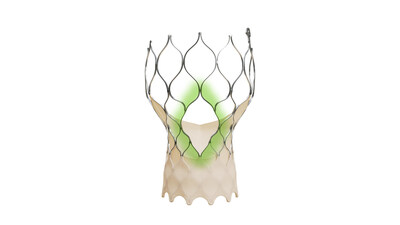Medtronic announces FDA approval of newest-generation Evolut TAVR system for treatment of symptomatic severe aortic stenosis
- None.
- None.
Insights
The FDA approval of Medtronic's Evolut™ FX+ TAVR system marks a significant milestone in the field of interventional cardiology. The device's design, which emphasizes larger coronary access windows, addresses a critical need for improved catheter maneuverability during transcatheter aortic valve replacement procedures. This innovation could potentially lead to reduced procedural times and complications, translating into cost savings for healthcare providers and improved outcomes for patients.
From an investment standpoint, Medtronic's expansion of its TAVR portfolio with the Evolut FX+ could bolster its competitive edge in the cardiac device market. It is important to monitor how the product's launch impacts Medtronic's market share and revenue growth, especially considering the high prevalence of aortic stenosis and the aging population. The ability to cater to all risk categories of patients could significantly expand the addressable market for Medtronic.
The approval of the Evolut FX+ system by the FDA signals an advancement in treatment options for severe aortic stenosis, a condition with a notably high mortality rate if left unaddressed. The larger windows of the device for coronary access could improve the procedure's safety profile by allowing easier access to the coronary arteries, which is particularly important given the anatomical challenges faced during TAVR procedures.
For clinicians, the promise of maintaining the Evolut platform's valve performance while enhancing coronary access could translate into broader clinical adoption. The medical community will be looking closely at real-world data post-launch to assess whether the procedural benefits are consistent with the claims made by Medtronic. Such data will be important for the long-term success and acceptance of the Evolut FX+ system.
The approval and upcoming launch of the Evolut FX+ TAVR system have implications for the healthcare economy. TAVR procedures are a cost-effective alternative to surgical valve replacement, particularly for patients who are at high or extreme risk for surgery. By potentially improving procedural efficiency and outcomes, the Evolut FX+ system could further reduce hospitalization costs and postoperative care expenses.
Moreover, the system's capacity to serve a wide patient population across various risk categories may lead to an increase in the volume of procedures performed, thereby impacting the overall cost dynamics within the cardiology sector. It will be important to analyze the cost-benefit ratio post-launch to understand the economic impact on both the healthcare system and Medtronic's financial performance.
The Evolut™ FX+ TAVR system leverages market-leading valve performance with addition of larger windows to facilitate coronary access
The Evolut FX+ TAVR system offers larger coronary access windows through a modified diamond-shaped frame design, which is four times larger than previous iterations of the Evolut TAVR system. Evolut FX+ provides increased space for catheter maneuverability to facilitate access to coronary arteries of varying patient anatomies. Additionally, the new design does not compromise the market leading valve performance, excellent hemodynamics, and radial strength that clinicians expect from the Evolut platform.1
"We are committed to consistently developing and advancing minimally invasive solutions for physicians to treat their patients with aortic stenosis. This is reinforced by our continued innovation of the Evolut TAVR platform, which has delivered proven valve performance and durability to physicians and patients for years. The Evolut FX+ TAVR system was designed to facilitate coronary access across a diverse range of patient anatomies with no compromise to valve performance," said Jeffrey Popma, M.D., vice president and chief medical officer for the Coronary & Renal Denervation business and the Structural Heart & Aortic business, which are part of the Cardiovascular Portfolio at Medtronic.
Severe aortic stenosis occurs when the aortic valve leaflets become stiff and thickened and have difficulty opening and closing, making the heart work harder to pump blood to the rest of the body. Severe aortic stenosis often reduces a patient's quality of life and limits their daily activities. If left untreated,
The Evolut FX+ TAVR system is indicated for symptomatic severe aortic stenosis patients across all risk categories (extreme, high, intermediate, and low) in the
About Medtronic
Bold thinking. Bolder actions. We are Medtronic. Medtronic plc, headquartered in Dublin,
Any forward-looking statements are subject to risks and uncertainties such as those described in Medtronic's periodic reports on file with the Securities and Exchange Commission. Actual results may differ materially from anticipated results.
1Medtronic data on file compared to the Evolut platform. Bench top model may not be indicative of clinical performance.
2Ross J Jr, Braunwald E. Aortic stenosis. Circulation. July 1968; 38(1 Suppl):61-67.
Contacts: | |
Rachel Murray | Ryan Weispfenning |
Public Relations | Investor Relations |
+1-651-332-3286 | +1-763-505-4626 |
![]() View original content to download multimedia:https://www.prnewswire.com/news-releases/medtronic-announces-fda-approval-of-newest-generation-evolut-tavr-system-for-treatment-of-symptomatic-severe-aortic-stenosis-302100338.html
View original content to download multimedia:https://www.prnewswire.com/news-releases/medtronic-announces-fda-approval-of-newest-generation-evolut-tavr-system-for-treatment-of-symptomatic-severe-aortic-stenosis-302100338.html
SOURCE Medtronic plc









